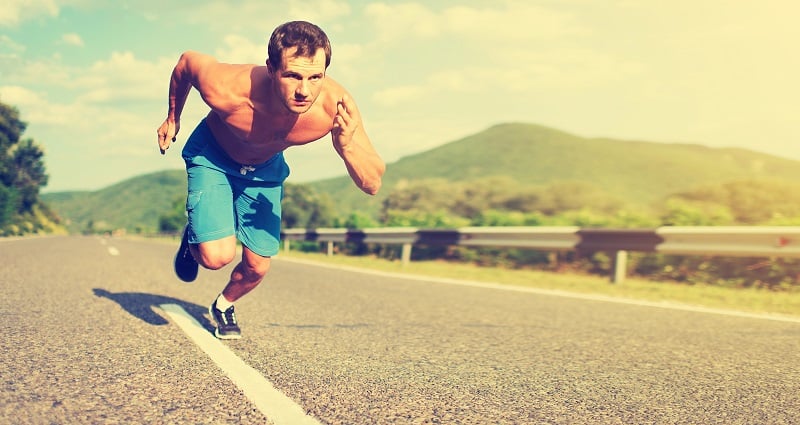Have you ever had more drinks than you should the night before a long run?
Maybe one post-run beer turned into three shots and four cocktails, and before you know it, you’re already drunk and calling for a taxi to get you home.
You know what will happen next—the dreaded hangover in the morning.
So should you run with a hangover? Or simply run another day? That’s what we’re going to tackle in today’s article.
Here’s the truth. Running with a hangover is as fun as scrapping your nails down a chalkboard. Not. Really. Enjoyable. At. All.
In today’s article, I’ll explain whether you should run with a hangover. By the end of the post, you’ll know enough to make a very informed decision.
The Impact Of Alcohol On The Body
Let’s first take a look at the impact of alcohol on your body.
Alcohol is a toxin that your body has to get rid of. Around 10 percent of booze is eliminated through breath, urine, and sweat. The liver does the rest, making it the primary organ in charge of detoxifying alcohol.
Once alcohol reaches your liver, the latter releases enzymes that break it down into ketones at a pace of roughly 0.015 /100mL per hour. This means the liver can process up to one ounce of booze, your standard drink, in one hour.
As you can tell, this process takes time, and the longer the toxin stays in your body, the worse your hangover symptoms will be.
Take in more, and you will overwhelm your system, forcing the extra alcohol to accumulate in the blood and body tissues until it can be processed. This is why having too many drinks can cause a spike in blood alcohol concentration that lasts for several hours.
So Can Running Cure a Hangover?
Again, we need some context. So first things first, what’s a hangover?
A hangover consists of a group of nasty symptoms that can develop after consuming alcohol at a faster rate than your body’s ability to metabolize it. That is not the whole story. Hangovers are also linked to mediocre performance, work conflict, and other troubles.
The rule of thumb is the more booze you consume, the higher the chances of experiencing a hangover the next day.
That said, no universal rule tells us exactly how much alcohol we can safely consume and still avoid a hangover. Everyone is different and processes liquor at a different rate. No suit fits all and all that.
When it comes down to it, the impact of a hangover depends on how your body metabolizes the alcohol (explained before).
When you drink alcohol, the intake triggers various bodily reactions that can worsen a hangover. These include :
- Dehydration
- Frequent urination
- A drop in blood sugar
- Irritation of the digestive tract
- Expansion of blood vessels
- And so much more
Depending on the amount and type of alcohol you consume, your hangover symptoms may include the following;
- Headache
- Diarrhea
- Trembling or shaking
- Fatigue and weakness
- Nausea, vomiting, or stomach pain
- Dizziness, vertigo, or a sense of the room spinning
- Shakiness
- Extreme thirst
- Muscle aches
- Rapid heart rate
- Increased blood pressure
- Dry mouth and eyes
- Mediocre concentration
- increased sensitivity to sound and light
- Irritability and other mood disturbances
- Bad sleep or insomnia
These symptoms, and some more, are triggered by the booze itself and the toxins produced while breaking down the alcohol.
Can Running Help Get Rid of Hangover?
If you’re a runner and have engaged in any form of drinking, you must have already heard exercise might help you “sweat out” a hangover.
But is there any truth to this? Or just another urban myth that keeps popping up everywhere?
The Answer
You cannot sweat out a hangover.
You make it worse by attempting to do so, leading to more detrimental symptoms.
That’s why you should avoid high-intensity exercise when recovering from a hangover.
Let’s explain some of the reasons.
Alcohol and Dehydration
Alcohol is a diuretic. The stuff stimulates your kidneys to expel more urine than it takes in, which causes dehydration. This is to blame for hangover symptoms such as headaches, dry mouth, and nausea.
Once dehydrated, your body will lack the key minerals and electrolytes needed to function optimally.
In a severe hangover, running may worsen your symptoms, especially if you had ingested more than you should the night before and haven’t started rehydrating and refueling yet with plain water and real food.
What’s more?
Running makes you work up a sweat which will make your dehydration even worse.
If you restore your body fluids in time, you may be able to exercise later in the day, but don’t use it as a cure. Being dehydrated will only make you feel worse.
Muscle Strain
Alcohol impacts your physiology, increasing levels of lactate and creatine kinase in your blood—both of which can negatively impact your muscles and other organs. This increases your risk of all types of soreness.
And you don’t want that.
Now that you have the answer for whether you should run or not following a night of drinking let’s look at a few measures to help avoid getting dehydrated or sick while drinking so you can maximize your training program.
Pay Attention
When dealing with hangovers, the best way to prevent them is not to have one in the first place.
Any form of excessive drinking will result in hangovers in most people.
Either avoid drinking or drink moderately. If you decide to drink, choose clear alcohols, such as white wine or vodka, which have fewer contaminants but don’t do to excess.
Don’t Run If You’re Dizzy
This should go without saying, but if you’re still feeling drunk or even a bit tipsy, do not run. When it’s the case, your body might not have finished metabolizing the alcohol.
Instead, drink plenty of water, have a full meal, and wait (or nap). Make it a rule to only exercise when you’re not drunk.
Red flags to pay attention to include:
- Increased heart rate
- Dizziness or disorientation
- Throbbing headache
- Hypersensitivity to light
Drink Water
Our body requires a lot of fluids when we run to regulate body temperature and maintain key metabolic processes.
Your cardiovascular and muscular systems also rely on essential electrolytes and minerals to function optimally.
So before you lace up your running shoes, hydrate—otherwise, you’re asking for trouble. Exercising without replacing the fluid and electrolytes drained by alcohol will make you feel worse.
Are you feeling lethargic? Have a sports drink or coconut water to give your body an even bigger dose of minerals and electrolytes, such as sodium and potassium.
What’s more?
Keep track of your hydration levels. If your urine is clear or light yellow, you’re well hydrated. When it’s not the case, it is time to drink more.
Eat Right To Cure The Hangover
Your diet also helps with your hangover.
To soothe the effects of a hangover, eat something rich in carbs, sodium, and potassium.
Some of the best choices include:
- Bananas
- Whole grain bread with peanut butter
- Oatmeal and fruit
And for the record, the theory that greasy foods cure a hangover is nothing but a myth. So save the bacon and eggs for your post-run meal/breakfast.
Train Light
Running more miles than you should—or too hard—when hungover can worsen your symptoms.
Going for a long run or performing a series of intense 400-meter intervals while hungover is probably not a good idea. If you’re still feeling tipsy, intensity can make you feel worse.
Instead, shoot for something light and easy, and short.
20 to 30 minutes is enough to help you get things going and, hopefully, relieve some hangover symptoms, such as fatigue and brain fog.
If you had a quality workout on the schedule, such as intervals or hill work, move it to another day when you feel fresh and ready.
Can Running Help Cure Your Hangover? – Conclusion
The answer to whether to run or not on a hangover hinges on you and the severity of your hangover.
All in all, I’d recommend that you avoid exercising following a night of drinking—or at the very least, keep the intensity very low and pay attention to your body.
But it’s really up to you. I’m only offering suggestions. You call the shots (no pun intended).


